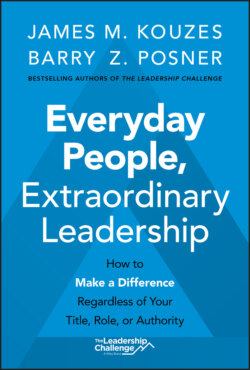Читать книгу Everyday People, Extraordinary Leadership - James M. Kouzes, Beth High, Джеймс Кузес - Страница 7
CHAPTER 1 Leadership Is Not a Position
ОглавлениеWHEN YOU HEAR the word “leader,” what immediately comes to mind?
Maybe you think of someone with a title, such as CEO, president, prime minister, or admiral. Maybe you think of some famous public figure, such as a celebrity actor or singer, start-up founder, or pro athlete. Maybe you think of someone from the history books who led a revolution, conquest, or world-changing movement. Or maybe you think of someone who created a breakthrough invention, won the Nobel or Pulitzer Prize, wrote a best-selling novel or Grammy-winning song. It's rather common to see these kinds of responses. They are reinforced every time you read one of those lists of the “50 Greatest Leaders of the Year.” In fact, if you take a look at one of the most well-known lists, you'll see that 100 percent of the so-called “greatest leaders” fall into these categories.1 It's true for young leaders as well. In a list of young global leaders prepared by the World Economic Forum, 85 percent of the young leaders held the title of a senior executive, founder, or government official.2 The majority of “leaders” who make these lists and are featured in the popular press are people with titles and at the apex of their organizations.
It's not that these individuals aren't leaders. They are. It's just that they are not the only leaders on the planet. In fact, they aren't even the majority of leaders. We've collected data from millions of people around the world and we can report, without a doubt, that there are leaders everywhere. There are leaders in every profession, discipline, and field, in every type of organization and industry, every religion, and every country; you find them from young to old, male, female, and gender non-conforming, across every ethnic and cultural category. Leaders are not just found at the top of organizations; they abound at all levels, including the middle, as well as on the front lines. There are leaders outside of formal organizations, too, in neighborhoods, community associations, clubs, sports teams, and families.
You could have a title like manager, director, or vice president. You could have people who report to you directly, but these would not necessarily make you a leader. Titles are granted, but being a leader is something that you earn, and you earn it not by your place in the organization but by how you behave. And through your behavior, you earn recognition as a leader in the eyes of those around you, and in the relationships you have with them. Indeed, it's much more likely that you are a leader who is a parent, coach, teacher, frontline worker, project manager, volunteer, community activist, or concerned citizen. You could also be a leader who is an individual contributor, professional, volunteer, analyst, consultant, representative, administrator, engineer, or scientist. You don't have to be at the top to lead; you can lead from any position or place.
So let's get something straight right from the start. Leadership is not a hierarchical level. It is not a title or a rank. It is not a position of power or a place of privilege. When you look up the word leadership in the dictionary it does not start with an uppercase L. It starts with a lowercase l, and lead, leader, and leadership literally derive from the word meaning “to go” or “to guide.” That's what leadership is all about: going places and guiding others.
From whom do people seek this kind of guidance and direction? We decided to find out.
